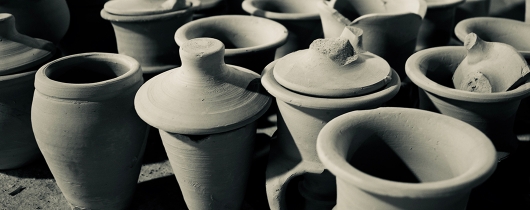Earthen Vessels | Vasijas de Barro

St. Kateri Tekakwitha
Exodus 3:1-6, 9-12; Matthew 11:25-27
Today’s readings and memorial reflect something that St. Paul observed: “we hold this treasure in earthen vessels, that the surpassing power may be of God and not from us” (2 Corinthians 4:7).
In 17th century North America, God worked through a humble young indigenous woman, partially blinded and scarred by smallpox. Kateri Tekakwitha was only 24 years old when she died. Today she is the patron of those who work to bring the richness of the many spiritual and cultural traditions of Native Americans into the life the of the Church in order to proclaim the gospel more authentically and effectively.
More than 1000 years before the time of Jesus, God spoke to a fugitive who had committed a homicide and asked him to lead his people from slavery to freedom. When God called him from the burning bush on Horeb, Moses protested, “Who am I that I should go to Pharaoh and lead the Israelites out of Egypt?” God assured him, “I will be with you.”
When God is with us, it doesn’t matter whether other people consider us worthy, wise, learned, or childlike. What matters is who God is and what God can do. In every age, God’s holy ones have demonstrated that God works through earthen vessels: simple, humble, fragile, and willing to be useful. - jc
--------------------------------------------------------------------------------------------------
Santa Kateri Tekakwitha
Éxodo 3:1-6, 9-12; Mateo 11:25-27
Las lecturas y la conmemoración de hoy reflejan algo que San Pablo observó: "guardamos este tesoro en vasos de barro, para que el poder supremo sea de Dios y no de nosotros" (2 Corintios 4:7).
En la Norteamérica del siglo XVII, Dios actuó a través de una humilde joven indígena, parcialmente ciega y con cicatrices de viruela. Kateri Tekakwitha sólo tenía 24 años cuando murió. Hoy es la patrona de quienes trabajan para incorporar la riqueza de las numerosas tradiciones espirituales y culturales de los nativos americanos a la vida de la Iglesia, con el fin de proclamar el Evangelio con mayor autenticidad y eficacia.
Más de 1000 años antes de la época de Jesús, Dios habló a un fugitivo que había cometido un homicidio y le pidió que guiara a su pueblo de la esclavitud a la libertad. Cuando Dios le llamó desde la zarza ardiente del Horeb, Moisés protestó: "¿Quién soy yo para ir al Faraón y sacar a los israelitas de Egipto?". Dios le aseguró: "Yo estaré contigo".
Cuando Dios está con nosotros, no importa que los demás nos consideren dignos, sabios, cultos o infantiles. Lo que importa es quién es Dios y lo que Dios puede hacer. En todas las épocas, los santos de Dios han demostrado que Dios actúa a través de vasos de barro: sencillos, humildes, frágiles y dispuestos a ser útiles. - jc




